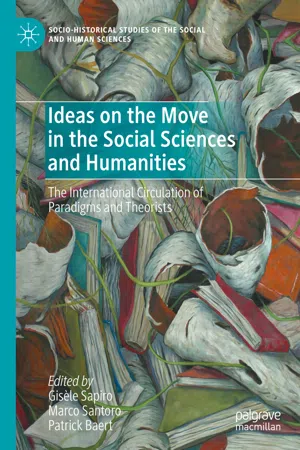The present volume is the outcome of the European project “International Cooperation in the Social Sciences and the Humanities: Socio-Historical Perspectives and Future Possibilities” (Interco-SSH), which gathered seven teams from seven countries (Argentina, Austria, France, Hungary, Italy, the Netherlands, and the United Kingdom). This volume follows two other collections stemming from the project and published in this same series (Heilbron et al. 2018; Fleck et al. 2018), and a special issue of the journal Sociologica (Santoro and Sapiro 2017). Other publications can be found on the project’s website: http://interco-ssh.eu/en/; https://halshs.archives-ouvertes.fr/INTERCOSSH.
End AbstractHow does knowledge circulate across countries and between disciplines?1 Paradigms and theories, as well as the scholarly controversies around them, have been powerful vehicles for the circulation of ideas and intellectual exchange (Merton 1968; Connell 2007; Bourdieu 1999/1989; Kuhn 2012; Keim et al. 2014). Beyond cultural and disciplinary boundaries, they provide a common language and a set of shared references. The objective of this volume is to elaborate on plausible explanations for the international circulation of ideas in the social and human sciences, based on case studies of these competing theories and paradigms and of the controversies they provoked. Simply put: against diffusionist theories that describe the circulation of ideas primarily in terms of contagion, the socio-historical approach developed here argues that ideas and knowledge are conveyed and circulated by agents (with their own strategies and positioning) and shaped by material conditions (books, journals, gatherings such as conferences, grants, etc.). These mediators and the conditions provide explanatory factors for understanding which theories and paradigms circulate and which do not, as well as for their appropriations and usages in the receiving country or discipline. This sociological approach has a strong commitment to historical research; the appropriations and uses of such paradigms and theories evolve differently in different contexts—in different disciplines and countries. A cursory glance shows that the social and human sciences do not form a unified global field, as attested by the variety of reception. This is in part because of the impact of both global and local social and political conditions: a paradigm can be politicized very differently in different countries, as we shall see in the case of structuralism or the Frankfurt school. Since some of these theoretical frameworks were more or less associated with major thinkers (e.g. Lévi-Strauss for structuralism), the present volume also aims to analyze how they acquired an international reputation.
The socio-historical approach developed here differs from the traditional history of ideas, which has tended to focus on the “influences” of ideas on canonical thinkers. This practice has been challenged both by Begriffsgeschichte (the history of concepts, from Cassirer to Koselleck and his students) and by the Cambridge school of intellectual history (from Skinner and Pocock to their followers; Jones 1981); both advocated a radical contextualization of canonical texts. While following this task of contextualization, our approach adds a sociological understanding of the agents that take part in this process. (By agents, we refer both to individuals and institutions.) Drawing on field theory and other sociological frameworks, we focus on their positioning, strategies, and specific interests. In this sense, this volume has affinities with both the French “new history of political ideas,” which marries a sociological framework with a contextualist approach (Matonti 2012; Hauchecorne 2019), and the Cambridge-based sociology of intellectuals, combining positioning theory with the same contextualized perspective (Baert 2015; Morgan and Baert 2015; Baert and Morgan 2018; Booth and Baert 2018). In a similar vein, in the United States (USA), the sociology of knowledge has been renewed in particular by Andrew Abbott (2001) and Randall Collins (1998), inspiring, together with Pierre Bourdieu’s work (1988/1984, 1991/1988), what Camic and Gross (2001) coined as the “new sociology of ideas.”
There are at least three main perspectives for the study of the circulation of ideas in the social and human sciences. The first focuses on systems of ideas, that is, paradigms, theories, and the like; the second analyses those institutions and organizations (such as departments or research centers) that host and shape intellectual production and consumption (e.g. Bourdieu 1988/1984; Lamont 1987; Camic 1995; Abbott 1999; Isaac 2012; Heilbron 2015 ; Santoro 2017); and the third studies “authors,” especially what are called—and this is in many respects a process of reputation building—key authors. In this volume, we address particularly the first (Part I) and the last (Part II).
A Matter of (National, Transnational, Global) Fields
While this volume is a pluralistic endeavor, Bourdieu’s field theory is one of the main theoretical frameworks used by the contributing authors (Bourdieu 1988/1984, 2004). Field theory aims at grasping the specific logics of relatively autonomous spheres of human activity, such as art, literature, and science. According to this view, the strategies of agents in these fields cannot be captured by rational choice theory, as they are motivated by interest (in the psychological sense), beliefs, passions, rivalries, attractions, and repulsions (as in magnetic fields) that stem from their inherited and acquired dispositions (habitus ). Fields are characterized by reference to their own history, which even when stabilized is an issue of perpetual struggle; for instance, about who the founding fathers and mothers of disciplines and the canonical texts are, or between cumulative versus revolutionary historical narrative. Fields are structured by unequal power relations between the established individuals on the one hand, who are endowed with a great amount of specific capital, and the newcomers or more marginal figures on the other hand. There is also a constant tension between (relative) autonomy and heteronomy with regard to ideological and/or commercial demands from outside forces (e.g. the State, political parties, corporations, and media).
Interactionist approaches to intellectual life have been renewed by network theory. For example, by drawing on a neo-Weberian stance and a Goffmanesque emphasis on rituals ...
